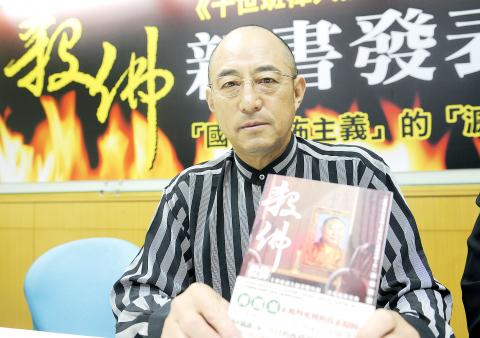The 10th Panchen Lama was murdered by former Chinese president Hu Jintao (胡錦濤) and former Chinese premier Wen Jiabao (溫家寶), a prominent Chinese dissident said in Taipei yesterday as he warned that Beijing’s cultural genocide in Tibet could serve an example for those Taiwanese who still have false expectations of China.
Citing the findings from his private interviews with Chinese and Tibetan officials, Yuan Hongbing (袁紅兵) told a press conference that the 10th Panchen Lama, Choekyi Gyaltsen, was poisoned to death in January 1989 rather than dying from a heart attack as the Chinese Communist Party (CCP) claimed.
Yuan, a Chinese writer who sought political asylum in Australia in 2004, detailed the findings in a book he co-wrote with Tibetan author Namloyak Dhungser titled Shafo (殺佛) — killing a Buddha — which has since been published in Taiwan.

Photo: George Tsorng, Taipei Times
The assassination was plotted by former Chinese presidents Deng Xiaoping (鄧小平) and Li Xiannian (李先念), and Bo Yibo (薄一波), father of disgraced Chinese official Bo Xilai (薄熙來), and he was executed by Hu and Wen, said Yuan, who first revealed the allegation in 2011.
However, the reason Taiwanese should pay attention to Tibet is far more than the Panchen Lama’s death, he said, as they should understand that Beijing’s cultural genocide spanning several decades had caused the death of 1.2 million Tibetans and at least 126 cases of self-immolation in recent years.
“I would say that Tibet is far away and close to Taiwan at the same time, because what happened and is happening in Tibet could happen in Taiwan in the future,” Yuan said. “When President Ma Ying-jeou (馬英九) suggested that the cross-strait flights are domestic flights, that told you how close Taiwan could be to becoming the next Tibet.”
The signing of a peace agreement with Beijing in 1951 and the retreat from being an independent country to an autonomous region had both failed to bring Tibetans the peace and religious freedom they deserve, Yuan said, and the CCP was never serious about keeping its promises.
“[Beijing] has never stopped oppressing the Tibetan people in the past six decades. When you realize that, I don’t know what expectations Taiwanese could have of the CCP,” Yuan said.
National Taiwan University Hospital physician Ko Wen-je (柯文哲), who is mulling running in the Taipei mayoral election next year, said Yuan’s book was a reminder to Taiwanese about what they could learn from Tibet.
“It is also important for Beijing to understand that what happened in Tibet was why most Taiwanese still have doubts about China’s ‘peaceful unification’ pledge. Past experiences show that the CCP has not been trustworthy,” Ko said.

Taiwanese can file complaints with the Tourism Administration to report travel agencies if their activities caused termination of a person’s citizenship, Mainland Affairs Council Minister Chiu Chui-cheng (邱垂正) said yesterday, after a podcaster highlighted a case in which a person’s citizenship was canceled for receiving a single-use Chinese passport to enter Russia. The council is aware of incidents in which people who signed up through Chinese travel agencies for tours of Russia were told they could obtain Russian visas and fast-track border clearance, Chiu told reporters on the sidelines of an event in Taipei. However, the travel agencies actually applied

Japanese footwear brand Onitsuka Tiger today issued a public apology and said it has suspended an employee amid allegations that the staff member discriminated against a Vietnamese customer at its Taipei 101 store. Posting on the social media platform Threads yesterday, a user said that an employee at the store said that “those shoes are very expensive” when her friend, who is a migrant worker from Vietnam, asked for assistance. The employee then ignored her until she asked again, to which she replied: "We don't have a size 37." The post had amassed nearly 26,000 likes and 916 comments as of this

New measures aimed at making Taiwan more attractive to foreign professionals came into effect this month, the National Development Council said yesterday. Among the changes, international students at Taiwanese universities would be able to work in Taiwan without a work permit in the two years after they graduate, explainer materials provided by the council said. In addition, foreign nationals who graduated from one of the world’s top 200 universities within the past five years can also apply for a two-year open work permit. Previously, those graduates would have needed to apply for a work permit using point-based criteria or have a Taiwanese company

The Shilin District Prosecutors’ Office yesterday indicted two Taiwanese and issued a wanted notice for Pete Liu (劉作虎), founder of Shenzhen-based smartphone manufacturer OnePlus Technology Co (萬普拉斯科技), for allegedly contravening the Act Governing Relations Between the People of the Taiwan Area and the Mainland Area (臺灣地區與大陸地區人民關係條例) by poaching 70 engineers in Taiwan. Liu allegedly traveled to Taiwan at the end of 2014 and met with a Taiwanese man surnamed Lin (林) to discuss establishing a mobile software research and development (R&D) team in Taiwan, prosecutors said. Without approval from the government, Lin, following Liu’s instructions, recruited more than 70 software